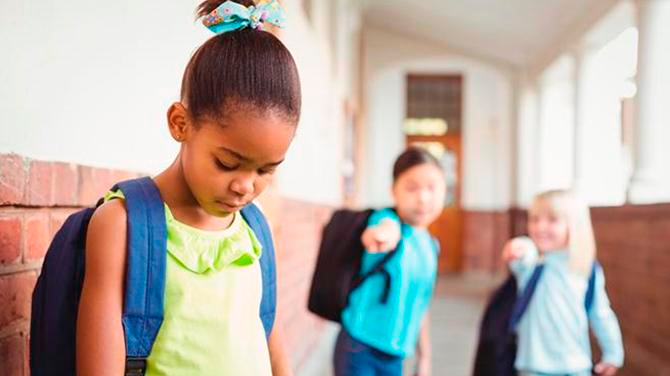The Impact of Childhood Bullying
 Bullying, according to Dr. Eli Lebowitz, is the intentional action of being hostile and taking deliberate action to cause another to suffer whether it be verbal, physical, social, psychological, or cyber. Both those who are bullied, and those who bully, face long-term risks of experiencing effects on their mental health. Any involvement with bullying increases the chances that a person will suffer from anxiety, depression, panic disorders, and in some cases, have suicidal thoughts/behaviors. Generalized Anxiety Disorder (GAD), chronic worry, and stress are heightened in all children being bullied, and as a result of being primed for hypervigilance, some children develop lasting Post Traumatic Stress Disorder (PTSD).
Bullying, according to Dr. Eli Lebowitz, is the intentional action of being hostile and taking deliberate action to cause another to suffer whether it be verbal, physical, social, psychological, or cyber. Both those who are bullied, and those who bully, face long-term risks of experiencing effects on their mental health. Any involvement with bullying increases the chances that a person will suffer from anxiety, depression, panic disorders, and in some cases, have suicidal thoughts/behaviors. Generalized Anxiety Disorder (GAD), chronic worry, and stress are heightened in all children being bullied, and as a result of being primed for hypervigilance, some children develop lasting Post Traumatic Stress Disorder (PTSD).
A risk factor for being bullied is simply being different. If there is anything that makes a child stand out they are more likely to be bullied. Some of the most common types of children that are likely to be bullied have a physical feature that attracts attention like height or weight, a different cultural background, religious affiliation, or ethnicity, a mental health disorder, a physical or learning disability, or a different sexual orientation. Even being smart, “gifted,” or skilled, in any regard, can make a child more likely to experience bullying.
In our current technological age, cyberbullying is becoming increasingly prevalent. The effects can be especially devastating to adolescents because cyberbullying can’t be escaped, it can be done anonymously, and it has the potential for rapid rates of distribution. It doesn’t end when school ends, and it can leave a permanent technological footprint and psychological impact.
Bullying reflects an imbalance of power- the one getting bullied is weaker in some way than the bullier. Often times, children don’t report bullying because of the fear that the bullying will increase or get worse. Social stigmas against being a tattletale can create a sense of shame about being bullied or telling a trusted adult that bullying is going on. In some situations, children believe that no one cares or that they can handle the situation on their own.
If you think that bullying is occurring, be on the lookout for some of the common signs that are listed below:
– Unexplained injuries
– Increased levels of stress, anxiety, or depression
– “Lost” belongings, money, clothes, etc.
– Loneliness
– Torn clothes
– Fear of school
– Somatic complaints (aches & pains)
– Bad dreams
– Changes in appetite, sleep, mood, and/or interests
– Declining school work
– Avoidance of social situations
Chances are if someone feels like they’re being bullied- they are! It’s unlikely that what feels like bullying behavior is being misinterpreted. If your child shares that they are being bullied stay calm, make sure they know it’s not their fault, and encourage them to continue speaking about it. Don’t hesitate to act because your child asks you not to get involved, for fear of making the situation worse, or because you think that eventually, the bullying will stop on its own. Working on your child’s behalf to intervene will allow you to model and teach appropriate ways to ask for help when it’s needed and reiterates that bullying isn’t tolerated.
Encouraging retaliation, criticizing, or telling your child to ignore it are all unhealthy way of coping with the news of them being bullied. Ultimately, this can lead to greater psychological harm. Some children, who lack proper guidance or coping skills, will turn to a weaker target and become a bully themselves. A great way to combat this is to work individually with your child to promote inclusivity of others. If faced with the situation of your child being bullied, use the experience to educate them about some of the common reasons why people bully others. It’s also important to work on teaching social skills, assertiveness, and building self-esteem with your child.
Children and teens who experience bullying show poor school adjustment, have more academic problems and are at risk of getting in trouble from acting on their own accord to address their bullies. Fear of being bullied at school can lead children to miss more school time, refuse attendance, or drop out altogether. Research has proven then being a victim of bullying creates long-term mental health effects and can lead to life-long struggles with anxiety and depression.
At GroundWork Counseling in Orlando, our therapists specialize in Cognitive Behavioral Therapy (CBT) that can effectively treat anxiety disorder and depression, and can help your child learn skills that will build upon their ability to confront anxiety-provoking situations and deal with negative emotions resulting from bullying. Our therapists also provide evidence-based therapy for children experiencing school avoidance or refusal behaviors, helping them face their fears and get back into the routine of normal attendance.
Speak With An Orlando Child Counselor
407-378-3000





